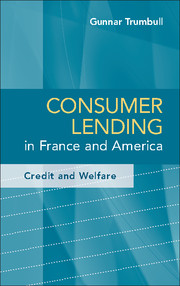Book contents
- Frontmatter
- Dedication
- Contents
- Figures and Tables
- 1 Introduction
- 2 Commercial Banks and Consumer Credit in the United States
- 3 Banks against Credit
- 4 American Retailers and Credit Innovation
- 5 Selling France on Credit
- 6 Credit and Reconstruction
- 7 The Politics of Usury
- 8 Credit for Being American
- 9 Deregulation and the Politics of Overindebtedness
- 10 Credit and Welfare
- Index
- References
8 - Credit for Being American
Published online by Cambridge University Press: 05 August 2014
- Frontmatter
- Dedication
- Contents
- Figures and Tables
- 1 Introduction
- 2 Commercial Banks and Consumer Credit in the United States
- 3 Banks against Credit
- 4 American Retailers and Credit Innovation
- 5 Selling France on Credit
- 6 Credit and Reconstruction
- 7 The Politics of Usury
- 8 Credit for Being American
- 9 Deregulation and the Politics of Overindebtedness
- 10 Credit and Welfare
- Index
- References
Summary
By the 1960s, the coalition in support of greater credit access in America was changing. American labor was becoming less enthusiastic about the virtues of consumer credit. It worried that high interest rates were disproportionately hurting poorer workers, and so fought the progressive liberalization of state usury caps. It sought legislation that would limit creative and misleading lending practices, including ballooning loans, wage garnishment, and loans secured against anything other than the product purchased on credit. More generally, it argued against promoting further credit access. Labor activist Sidney Margolis, writing in 1973, warned: “The one thing most debt-ridden families don't need is still easier credit. Raising rates to encourage easier credit…would be self-defeating for the low-income families.” But just as labor was becoming disenchanted with credit, other rights groups began seizing on credit access as part of a broader campaign that pushed the idea of economic citizenship. By shifting the terms of the discourse about credit from one of economic welfare to one of economic rights, these groups helped promote the idea of credit access even as the social costs of debt were becoming apparent.
The first rights-based groups to mobilize actively around credit access were poor urban blacks. In a series of public-private initiatives, coordinated through the federal Office of Economic Opportunity and nonprofit Urban Coalition, retailers, banks, and local governments experimented with supporting credit to poor welfare recipients who could not pass standard creditworthiness tests. This movement found its most compelling expression in the National Welfare Rights Organization (NWRO), a grassroots organization of welfare mothers that rallied around the cause of retail credit access. The NWRO was followed by the women's movement. For middle-class white women the NWRO credit campaign strongly evoked their own credit struggles. From the early 1970s, the National Organization for Women (NOW) spearheaded a campaign to secure personal credit ratings for women. This battle was won with the passage of the Equal Credit Opportunity Act (ECOA) of 1974. The NOW victory in turn opened the door for poor urban blacks. In 1977, an amendment to ECOA extended the definition of discrimination to include not just sex but also race. In the same year, the Community Reinvestment Act (CRA) required banks to lend in the communities where they took deposits. Within the space of ten years, credit had been reenvisioned as an encompassing economic right in America.
- Type
- Chapter
- Information
- Consumer Lending in France and AmericaCredit and Welfare, pp. 168 - 190Publisher: Cambridge University PressPrint publication year: 2014



